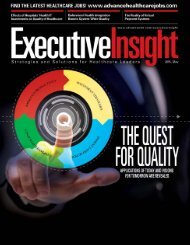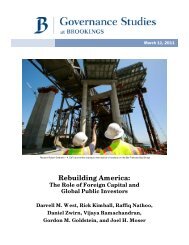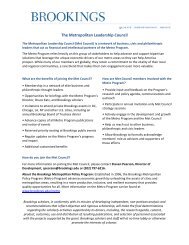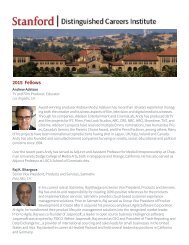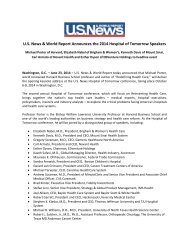Richard Kimball of HEXL Interviewed by Vivian Van Dijk of EyesIn.com.pdf
In this edition @EYESINMagazine shares insightful interviews, images and inspiration from the world’s innovative creators. HEXL CEO Richard A. Kimball, Jr shares his thoughts on health and technology. #RichardAKimballjr
In this edition @EYESINMagazine shares insightful interviews, images and inspiration from the world’s innovative creators. HEXL CEO Richard A. Kimball, Jr shares his thoughts on health and technology. #RichardAKimballjr
- No tags were found...
Create successful ePaper yourself
Turn your PDF publications into a flip-book with our unique Google optimized e-Paper software.
NEW YORK HEALTH<br />
<br />
A Conversation With<br />
Entrepreneur and Founder <strong>of</strong><br />
<strong>HEXL</strong>: <strong>Richard</strong> A. <strong>Kimball</strong>, Jr.<br />
As a child, did you know what you wanted<br />
to be<strong>com</strong>e?<br />
I did for my first career, but now I’m on my<br />
second. My first career I was an investment<br />
banker for 26 years and I wanted to do that<br />
when I was a child. I followed my dream and<br />
achieved that, and then retired.<br />
In which town did you grow up?<br />
I grew up in the Northeast. I was born<br />
outside <strong>of</strong> Boston and lived in Myrtle Head,<br />
Massachusetts. I went to boarding school in<br />
Andover and then went to Yale University. I<br />
worked most <strong>of</strong> my career as an investment<br />
banker in New York, but also Tokyo, Hong<br />
Kong, London, Paris and Geneva.<br />
Do you think your background has<br />
influenced your chosen pr<strong>of</strong>ession in the<br />
healthcare industry? If so, what specific<br />
element in your background is most<br />
pervasive in influencing your current<br />
approach in your pr<strong>of</strong>ession?<br />
I really followed my father’s footsteps into<br />
the security’s business. I really wanted to be<br />
connected to my father, and when he would<br />
<strong>com</strong>e home from work I always asked him<br />
about what the stock market did that day,<br />
and learned a lot about the markets from my<br />
dad. My mother is a district county minister.<br />
In midlife, after being a social worker for a<br />
very long time, she found that giving food and<br />
furniture to needy people wasn’t getting them<br />
out <strong>of</strong> their situation. She decided that she<br />
wanted to make a greater impact on the world,<br />
and so she thought that if she could minister<br />
and counsel them that that would be a better<br />
way to help them get their lives on track.<br />
So I think that my higher social purpose<br />
came from my mother. Also, I watched<br />
my ex-father-in-law, who was successful in<br />
government and business and gave back to<br />
serve the country. I feel like this is my time<br />
to do good and help improve society.<br />
Your background is as a financial executive<br />
with investment banking, venture capital and<br />
public policy experience. How did you be<strong>com</strong>e<br />
interested in the healthcare industry?<br />
I felt that I had not made enough <strong>of</strong> an impact<br />
upon the world as an investment banker, and<br />
so I wanted to be an entrepreneur who could<br />
cause a transformation in the United States,<br />
specifically the healthcare industry, which is<br />
so dysfunctional at the moment.<br />
Would you please describe the work<br />
that you do and your interests in the<br />
healthcare industry?<br />
As you probably know, we spend three<br />
trillion dollars a year on healthcare in the<br />
United States. Eighty percent <strong>of</strong> that is<br />
for people with chronic conditions, but we<br />
prescribe a series <strong>of</strong> medication and then<br />
send them home, knowing that there is less<br />
than a 50 percent adherence rate to taking<br />
the medication. They are unlikely to change<br />
their diet and lifestyle. In 5-10 years, those<br />
people will end up back in the hospital with<br />
another serious condition. The system<br />
has let these people down. We knew what<br />
the problem was, knew they couldn’t fix it<br />
themselves, yet we spend 18 percent <strong>of</strong> our<br />
GDP on healthcare and still can’t figure out<br />
how to help these people help themselves.<br />
Most <strong>of</strong> the estimates suggest that we are<br />
over-utilizing and wasting over one trillion<br />
dollars a year out <strong>of</strong> the three trillion spent<br />
on healthcare. There are great debates<br />
in Washington over how to save just one<br />
trillion over 10 years, when this is a problem<br />
accumulating 10 trillion over 10 years.



